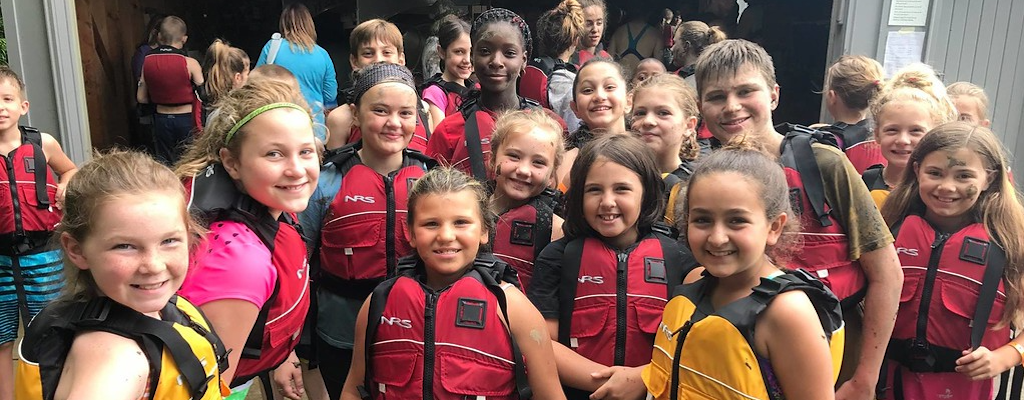A Thing Worth Saving

All across the United States summer camps are either in full swing or beginning to wind down as August creeps along. In the northeastern corner of Ohio, at Camp Ho Mita Koda, camp ended three weeks ago now. There’s a satisfaction and an energy, a certain joy, that still hangs over the seventy-three acres of rolling hills, woods and meadows where the camp sits.
Talking to campers, parents, staff and board members, you hear more than just happiness or pride in their voices. There’s gratitude. There’s relief.
The truth is that after 85 years of operation, Camp Ho Mita Koda, a summer camp for children with type 1 diabetes (T1D) that focuses on teaching them medical life skills and giving them one week a year where they feel like completely regular kids, almost closed for good this spring.
In April, the Diabetes Partnership of Cleveland, a nonprofit that provides community services and funds the camp, voted to end operations at the camp due to the costs. Essentially the camp was going out of business.
The shock and outcry both in the community and on social media was immediate. A group of camp supporters banded together, launching an effort to save the camp. Among the initial advocates were Julia Blanchette, a student at the Frances Payne Bolton School of Nursing who had attended a similar camp in Massachusetts as a child, and Ted Rusinoff, national sales manager at Secured Advantage, an insurance management company.
“At camp the kids feel normal,” said Rusinoff, whose 13-year-old daughter had attended the camp in the past. “They think, ‘I’m not different from everybody else. We’re all the same here.’ I asked my daughter why she liked camp. I thought she’d say kayaking, campfires and songs. That kind of stuff. Instead she said, ‘Dad it’s the only place on the planet that I feel normal.’ After she told me that I knew there was no way we could let this place close.”
A twelve-person meeting was held shortly after the closing announcement. “Everyone around the table had different backgrounds,” Rusinoff said, “but everyone had a relationship to the camp. They were either type 1 and had gone or had kids who had gone.”

Rusinoff and Blanchette formed a new board of directors and applied for nonprofit status as the Camp Ho Mita Koda Foundation. While the camp had been salvaged, it’s future for the summer was still bleak. When a nonprofit announces they are closing, they are no longer allowed to solicit donations. Donations had been integral to the camp’s success. Rusinoff said insulin donations alone totaled $100,000 to $200,000 per year. And Camp Ho Mita Koda Foundation’s 501c3 status had yet to be fully approved by the IRS.
“We couldn’t solicit insulin for the camp,” Rusinoff said. “We needed an established 501c3 partner that could make pharmaceutical requests and secure insulin, syringes and needles for us to use.”
That was when Rusinoff got in touch with Beyond Type 1, and Beyond Type 1 agreed to partner with the camp, allowing them access to the supplies they needed to remain open.
The camp, which was the first of its kind in the country, was founded in 1929 by Dr. Henry John, the first United States doctor to clinically use insulin to treat diabetes, and his wife, Betty. Their hope was to offer programs specially designed to aid kids with diabetes. At the camp, kids between the ages of 4 and 17 get to live among a peer group dealing with similar issues, self-manage their diabetes through personal responsibility and healthy choices and form a life-long network of friends.
In addition to traditional summer camp activities such as archery, boating, hiking and naturalist adventures, horseback riding and arts and crafts, the camp also focuses on teaching kids skill sets to help manage their diabetes. “Some kids, for instance, come to camp unable to give self injections because their parents do it,” said Rusinoff. “The nurses on staff teach the campers the techniques and the kids are celebrated for learning the skill. Other kids come unable to do their own pump change, and by the end of the camp week are changing their own pump with ease.”
 At Camp Ho Mita Koda the counselors come from all over the world, and almost all of those counselors have T1D themselves. This summer the camp ran three separate sessions. Children between the ages of five and 11 attended a day camp between July 16 and July 18. The first overnight session, which was for kids between the ages of eight and 11, ran from July 9 to July 14. And Children between the ages of 12 and 15 were at the camp between July 16 and July 21 for the second overnight session.
At Camp Ho Mita Koda the counselors come from all over the world, and almost all of those counselors have T1D themselves. This summer the camp ran three separate sessions. Children between the ages of five and 11 attended a day camp between July 16 and July 18. The first overnight session, which was for kids between the ages of eight and 11, ran from July 9 to July 14. And Children between the ages of 12 and 15 were at the camp between July 16 and July 21 for the second overnight session.
Rusinoff said the camp sessions were as fulfilling as past years, but that this year there was an added level of gratitude among parents, campers and counselors, many of whom were integral in the campaign to save Camp HoMita Koda. Plans are already underway for next summer’s camp sessions. The future, which once looked bleak in northeastern Ohio, has become bright again.
“One day, when T1D is cured, that would be a good day for us not to have camp anymore,” said Rusinoff.
Learn more about Beyond Type 1’s grantees and discover Beyond Type 1’s Camp Finder Tool.





